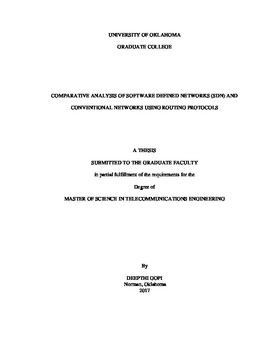| dc.contributor.advisor | Cheng, Samuel | |
| dc.contributor.author | Gopi, Deepthi | |
| dc.date.accessioned | 2017-05-15T16:51:05Z | |
| dc.date.available | 2017-05-15T16:51:05Z | |
| dc.date.issued | 2017-05 | |
| dc.identifier.uri | https://hdl.handle.net/11244/50872 | |
| dc.description.abstract | Conventional routing protocols such as RIP, OSPF, EIGRP and BGP have a very rigid and intricate system thus narrowing the adaptability of networks to the ever changing Internet, the emergence of Software Defined Networking (SDN) provides a solution for this problem. Due to the handiness of a centralized controller, SDN has provided an effective method in terms of routing computation and fine control over data packets. Due to the increase in unpredicted failures taking place the ability to predict/ know the approximate maximum time it takes for these networks to converge in order to avoid and/or minimize loss of packets/data during these failures has become crucial in today's world. This time that the routers in the network take to converge via the implemented routing protocol to resume communication or transfer of information again is called the routing convergence time.
In this thesis, the performance is evaluated by measuring the routing convergence time during link failure with respect to the topology scale of the networks to show that SDN routing/forwarding is better compared to conventional routing. Further the results indicate that the routing convergence time is less in SDN networks on comparison with conventional networks when the topology scale is increased, indicating that SDN networks converge faster during link/node failures in comparison with Conventional networks and that routing convergence time is greatly influenced with the changing topological size/increasing network size. I believe that this work can throw light upon many advantages in SDN with regards to faster convergence during failures in contrast to archaic conventional networks. | en_US |
| dc.language | en_US | en_US |
| dc.subject | Software Defined Networks (SDN) | en_US |
| dc.subject | Conventional Networks | en_US |
| dc.subject | Border Gateway Protocol (BGP) | en_US |
| dc.subject | OpenFlow Protocol | en_US |
| dc.subject | Convergence process | en_US |
| dc.subject | Routing Convergence Time | en_US |
| dc.subject | Routing Protocols | en_US |
| dc.title | COMPARATIVE ANALYSIS OF SOFTWARE DEFINED NETWORKS (SDN) AND CONVENTIONAL NETWORKS USING ROUTING PROTOCOLS | en_US |
| dc.contributor.committeeMember | Huck, Robert | |
| dc.contributor.committeeMember | Imran, Ali | |
| dc.date.manuscript | 2017-05 | |
| dc.thesis.degree | Master of Science in Telecommunications Engineering | en_US |
| ou.group | College of Engineering::School of Electrical and Computer Engineering | en_US |
| shareok.nativefileaccess | restricted | en_US |
